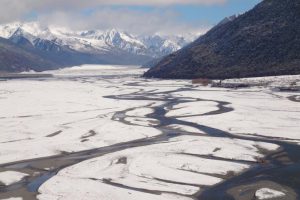WelCom June 2017: The recently released findings into the contaminated water-supply at Havelock North are a wakeup call about clean water-management processes, responsibilities and accountabilities for all of us. The OECD and the Ministry for the Environment reports on New Zealand’s environment, released in April, include specific sections on water resources and fresh water management. In his encyclical letter, Laudato Si’, Pope Francis calls for a whole approach in our Care for our Common Home. Fr Peter Healy sm says that as communities of disciples the context of our spiritual calling is now an ecological one.
Sky
If the sky knew half
of what we’re doing down here
it would be stricken,
inconsolable,
and we would have nothing but rain.
This short poem by Brian Turner is poignant and powerful. It says so much with so few words. What we do and fail to do has repercussions everywhere. Our recent rain storms have been like torrents of grief from on high. An inconsolable God is rapping on the doors of our dull vision. Nature in the language of deluge and flood inviting us to wake up.
A letter to the DomionPost on dairy farming put it like this, ‘the current run off from the country’s 6.5 million cows amounts to 182,000 tonnes of cow dung a day, or one million tonnes every five and a half days, and 84.5 million litres of cow urine a day, or one billion litres every 12 days’. This is an enormous amount of animal waste. It is more than our shared landscape can manage and contain. It is the product of an agricultural industry that many argue is in overshoot and unsustainable. It indicates our obsession with the values of economic growth over and above our duty of care to finite parcels of land and fresh water .
The OECD report 2017 observed that ‘if New Zealand’s GDP took into account environmental costs, the economy would actually be shrinking’.
The state of our rivers and streams has been in the news for many months. It is an on-going story of neglect and degradation. The report Our fresh water 2017 warns us that nitrogen levels are getting worse at 55 per cent of the monitored river sites across New Zealand. Nearly three quarters of our native fish species are threatened or on extinction watchlists. Those of us living in towns and cities cannot finger point our rural cousins either. E.coli levels are 22 times higher in urban areas than rural. Much of this is the result of overloaded and stressed city sewage systems.
What we are doing is a long way from the mutually beneficial relationship with nature that we aspire to. We are not worthy members of the ecosystems we inhabit.
“As communities of disciples the context of our spiritual calling is now an ecological one.”
As communities of disciples the context of our spiritual calling is now an ecological one. We are called ‘to go out to the whole world’ with the eyes of an-integral-ecological-sensibility as proposed to us in Laudato Si’. The one dimensional vision of the natural world as something external and distant from us, is over. We are members of an inclusive world that is rivers, lakes, pasture, animals, insects, fish, forests, atmosphere and us. We are profoundly connected. To care for creation is to care for ourselves and our Creator. We are called to be co-creators with our ever living and sustaining God of all things.
“The one dimensional vision of the natural world as something external and distant from us, is over.”
The Whanganui River now has legal status as a person (Te Awa Tupua Act). From the point of view of Catholic Social Teaching we appreciate this new phase of the river’s life. We take hope in the dignity of this long body of water, we stand beside her recognising her sisterly rights, we make an option to be in relationship of care with her, we think of her good as our good, we support all those who support her, we join te iwi o te awa and their connection to her well-being, we desire to participate with them in her future health and flow. We look forward to other rivers coming into this kind of status and trusteeship.
“Who is caring for this waterway and how can I join them?”
The challenge for each of us to is come into relationship with the stream or river near us. Spending time on its banks listening and observing what do I hear? What do I notice about my connection to this body of water? Who is this waterway to me? What is its story and state? How does my well-being and the well-being of this waterway intersect? Who is caring for this waterway and how can I join them? What kind of friend would I like to be to my nearby stream?
We are all only ever on-the-way and in-the-process-of becoming genuine inhabitants of Papatūānuku/mother Earth.
Peter Healy sm resides at Whānau Maria, Ōtaki, and has been on an ecological journey for many years.
